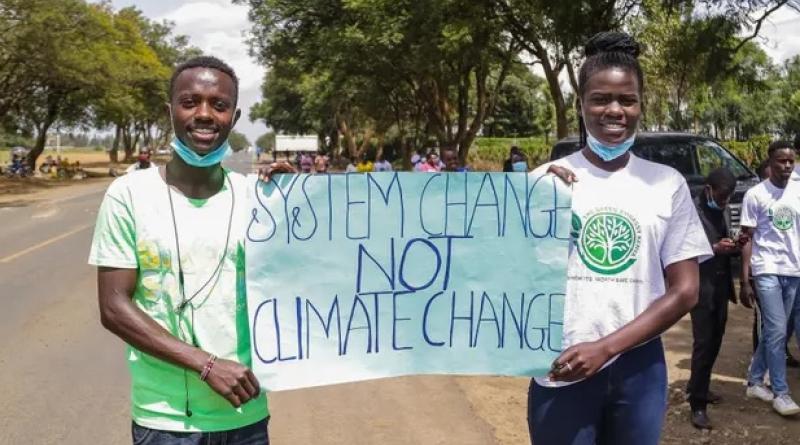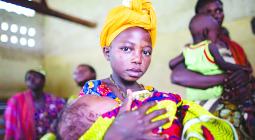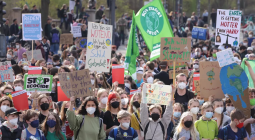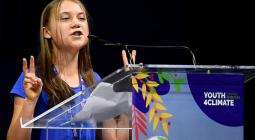Give Africa’s youth a voice in shaping the climate agenda. It is their future at stake

By 2050, Africa’s 1bn children will bear the brunt of the climate crisis, yet they have no say in decisions largely made by old men
It is ironic that Africa – sometimes called the “youngest continent” due to the average age of its population being below 20 – has the oldest leaders in the world. Ten of Africa’s political leaders are over 75; the average age of an African president is 62.
According to the Global Center on Adaptation, young people in Africa are often excluded from politics precisely because Africa has its oldest generation squarely at the helm of political leadership.
There is nothing wrong with recognising the wisdom to be gained with age, and many African societies have a long and proud tradition of honouring and respecting their elders. But the dominance of political decision-making by men (yes, it is largely men) far past pensionable age is deeply concerning, especially when it comes to dealing with the climate crisis – fresh, innovative thinking is needed now, and well into the future.
Africa’s youth – including those not yet born – will bear the financial, environmental and social costs of our failure to meaningfully address the climate crisis in the decades since the alarm was first raised.
Africa’s significant income disparities and social inequalities will, in all likelihood, get worse as we progress through the 21st century, exacerbating poverty and intergenerational economic injustice.
The majority of Africans are under 18, and according to the Children’s Climate Risk Index, a overview of children’s vulnerability to the impacts of global heating drawn up by Unicef, an estimated 490 million children in 35 sub-Saharan countries are at risk from the worst effects of the climate crisis. By 2050, Africa will be home to one billion children and young people who, given the right chances in life, could power a social and economic renaissance across the continent.
However, the economic impacts of climate breakdown mean they face an uncertain and unenviable future of reduced opportunities, earning potential and productivity, coupled with curtailed personal and professional development. The very people who have most to lose – children and young people – are largely excluded from shaping their own future.
This week, I am taking part in the African Child Policy Forum’s Ninth International Policy Conference in the Ethiopian capital, Addis Ababa, which will focus on the climate crisis and child rights in Africa. Alongside politicians, academics and experts, I will hear from young people about the impact of climate breakdown on their lives now and in the future.
It is only right that the voices of the young should be heard and integrated into policy decisions and actionable next steps – but this is all too rare. We need a groundswell of climate activists and young Africans in their millions to take up the charge in charting a climate-just future.
I am heartened that young climate activists are increasingly influencing global debates. From Senegal’s Yero Sarr to South Africa’s Raeesah Noor-Mahomed, from Uganda’s Vanessa Nakate to Morocco’s Fatna Ikrame El Fanne, African youth are passionate and vocal. Their voices will join thousands of others at the UN Cop27 climate talks in Egypt, demanding action for a fairer, sustainable future.
African governments urgently need to step up their financial investment and economic policies to prevent and respond to the effects of the climate crisis on children. We know it exacerbates existing global injustice; Africa – responsible for the lowest share of the world’s greenhouse gas emissions – is expected to face the highest cost. It is only right that the most developed nations, which are mainly responsible for the climate crisis, should foot much of the bill for adaptation and mitigation measures. But African governments also have a responsibility to ensure that investing in a climate-resilient future does not come at a cost to young people.
Current and future generations face a paradox. On the one hand, the economic impacts of climate breakdown are significant and worsening. Adaptation, mitigation and building resilience are expensive, but without such expenditure, gross domestic product could be reduced by up to 30% – with dire consequences for employment and growth prospects.
On the other hand, governments and international donors may be tempted to divert precious budgets away from existing programmes in order to fund adaptation infrastructure. Which means already inadequate funding for education, child protection, nutrition, health and social care could be further cut.
Faced with these existential challenges, it is clear to me that children and young people should have greater involvement in shaping their own futures. They must be an integral part of the decision-making process and be meaningfully involved in shaping the climate agenda today and in the years to come.
Graça Machel is chair of the board of trustees of the African Child Policy Forum, the Foundation for Community Development and the Graça Machel Trust
COVER PHOTO: Young Kenyans at a Fridays for Future protest in Nakuru. Some 490m children in 35 sub-Saharan countries will face the worst of the climate crisis. Photograph: James Wakibia/Sopa/Shutterstock





